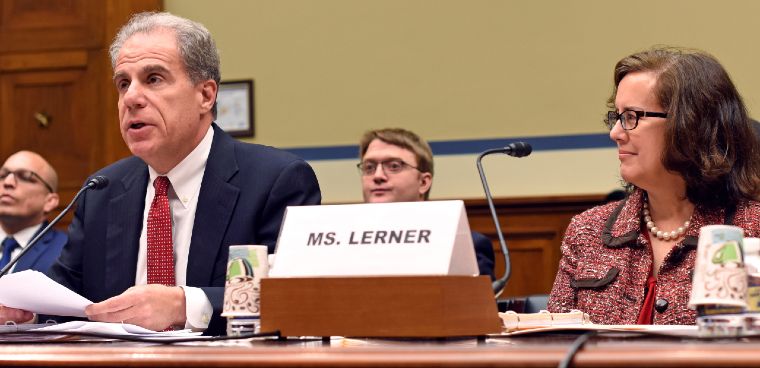IGs look to expand investigative authority
Agency watchdogs told lawmakers that they would like authority to subpoena former federal employees, contractors and other non-governmental witnesses to give testimony in IG probes.

Justice Dept. Inspector General Michael Horowitz (left) and National Science Foundation Inspector General Allison Lerner testify before the House in April 2018. (DOD photo by Michelle Gordon)
Agency inspectors general are seeking new authority to compel witness testimony from individuals outside the government to support investigations.
The lack of subpoena authority can impede investigations by hindering IGs' ability to get information from former employees, federal contractors, grant recipients and other non-governmental witnesses, Michael Horowitz, Inspector General at the Department of Justice, said at a Thursday hearing of the Senate Homeland Security and Government Affairs Committee.
"I can cite example after example in our high profile cases," Horowitz said. "But it happens very frequently in our not-so-high-profile cases where individuals simply refuse to appear. Or we've had occasions where people have resigned a few hours before a compelled interview precisely because they want to avoid speaking to us."
Some watchdogs already have this authority, he said, including the IG at the Department of Defense.
Often simply having the authority can encourage witnesses to cooperate without the IG actually using it, according to Horowitz and Allison Lerner, current chair of the Council of the Inspectors General on Integrity and Efficiency (CIGIE) and IG at the National Science Foundation.
Sen Maggie Hassan (D-N.H.) and Chuck Grassley (R-Iowa) have already introduced a bill this past May that would do this. Their bill requires IGs give seven days advance notification to the Department of Justice before issuing such subpoenas and instructs IGs to "take into consideration any objection provided by the Attorney General relating to the subpoena."
Lerner said that IGs could avoid abusing subpoena authority by adapting processes used for documentary subpoenas, which go through layers of approval before being issued.
Other measures discussed at the hearing include a bill requiring a 30-day notice from the president with a detailed explanation before an IG is put on non-duty status and a provision governing who may be tapped to serve as IG in an acting capacity in the event of a vacancy. Currently, senior officials within the agency being overseen by the IG and political appointees can serve in that role. Senators are considering limiting that group to senior-level, nonpartisan employees who're already in the watchdog community,
"It's absolutely vital that our federal watchdogs are able to work independently and without the threat of political interference," said committee chair Gary Peters (D-Mich.). "Current law allows for actions that threaten to undermine this independence, including the removal of Inspectors General from office without sufficient explanation, and the appointment of partisan political operatives to serve in these traditionally nonpartisan roles."
NEXT STORY: Civic tech vendor recognizes employee union






